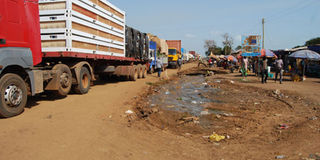MPs want Shs11 billion market constructed at S.Sudan border

Business at the current Elegu border market. MPs recommend the allocation of Shs11 billion for construction of the market to improve cross border trade. PHOTO CISSY MAKUMBI
What you need to know:
Goal. Starting the market aims at improving cross border trade between the two countries and save Ugandan traders from the risky business inside S.Sudan
Kampala.
Parliament’s Committee on Trade and Tourism has thrown its weight behind plans to construct a Sh11 billion market at the Uganda-South Sudan border in the next Financial Year.
Appearing before the Budget Committee for onward transmission to the House, the chairperson Keneth Lubogo (NRM, Bulamogi) said the market will save traders from the dangerous in-land South Sudan markets.
“The Committee recommends that government allocates Shs11 billion for construction of a pilot border market in Elegu since its master plan was developed and is ready,” read the report, in part.
Mr Lubogo noted that starting the market will “improve on the cross border trade between the two countries and save Ugandan traders from the risky business in South Sudan,” he said.
The Committee chairperson Amos Lugoloobi (NRM, Ntenjeru North) gave the move a go ahead but criticised the budget size, which he said should be revised downwards.
“What kind of market costs Shs11 billion? I think that is on the high side, we shall consider it but the budget should be smaller than that,” he said.
Mr Lubogo said that much as the South Sudan market serves a strategic value to the Ugandan economy, little has been done to streamline and make trading safer especially given the volatile nature of South Sudan.
Relatedly, the Committee wants government to review the liberalisation of the economy, implemented after recommendations of the World Bank and International Monetary Fund.
“There is need for government to review the liberalisation policy on certain selected sectors of the economy as a strategic support to the indigenous industries and to protect consumers against unfair market prices,” he said.
The MPs singled out the ongoing sugar crisis to illustrate what they termed the “exploitation of consumers” because of absence of government legulation.
“Lack of government regulation in the production and distribution chain has led to exploitation of consumers,” he said.
Members on the Budget Committee asked Mr Lubogo to go all smiles as they promised to recommend to the House what his Committee has adopted.
With just about five days to the end of the budgeting process as required by the Public Finance Management Act, Committees are reporting to the Budget Committee, which will transmit the same to form part of the Appropriation Bill 2017.
Importance of South Sudan
According to data from the Trade ministry, South Sudan became Uganda’s leading export destination in 2008 following the signing of the Comprehensive Peace Agreement in 2005.
Just three years later (in 2008), total exports (both formal and informal) peaked at $1.18 billion (nearly Shs4 trillion). About five years down the road, the gains were quickly eroded as the environment quickly degenerated into political chaos.
“However, the fighting that broke out in December 2013, sparking off a civil war in South Sudan, caused a steady decrease in Uganda’s exports from $414m (Shs1.3 trillion) in 2013, to $385m (Shs1.2 trillion) in 2014 and $353m (Shs1.1 trillion) in 2015.
South Sudan is currently facing two shocks: internal instability and external shocks due to decline in oil prices.
Consequently, for the 12 months to May 2016, Uganda’s exports to South Sudan had declined by 31 per cent from $423.6 million (about Shs1.4 trillion) in the 12 months to May 2015 to $290.8 million (about Shs981 billion) in the 12 months to May 2016.




